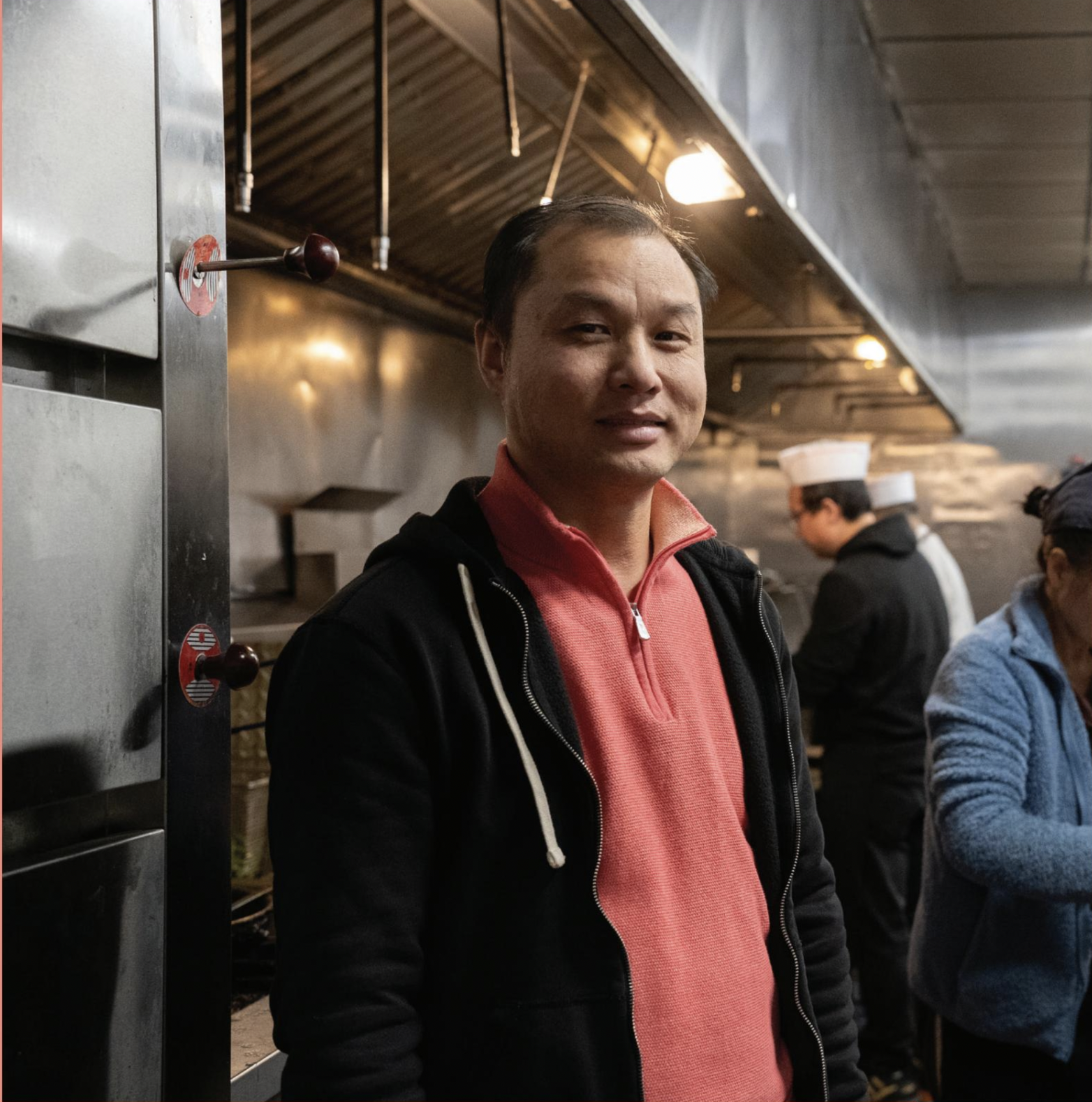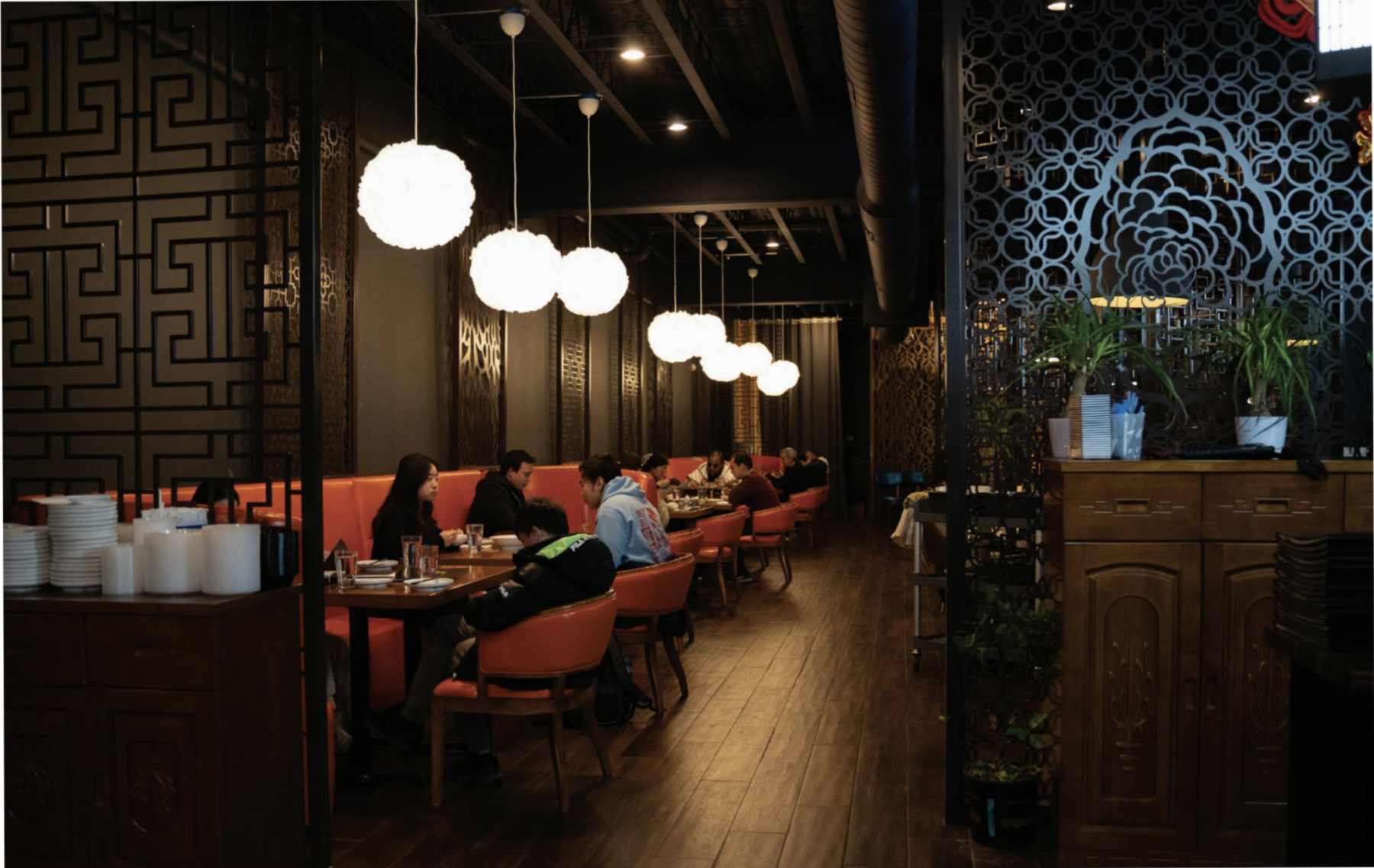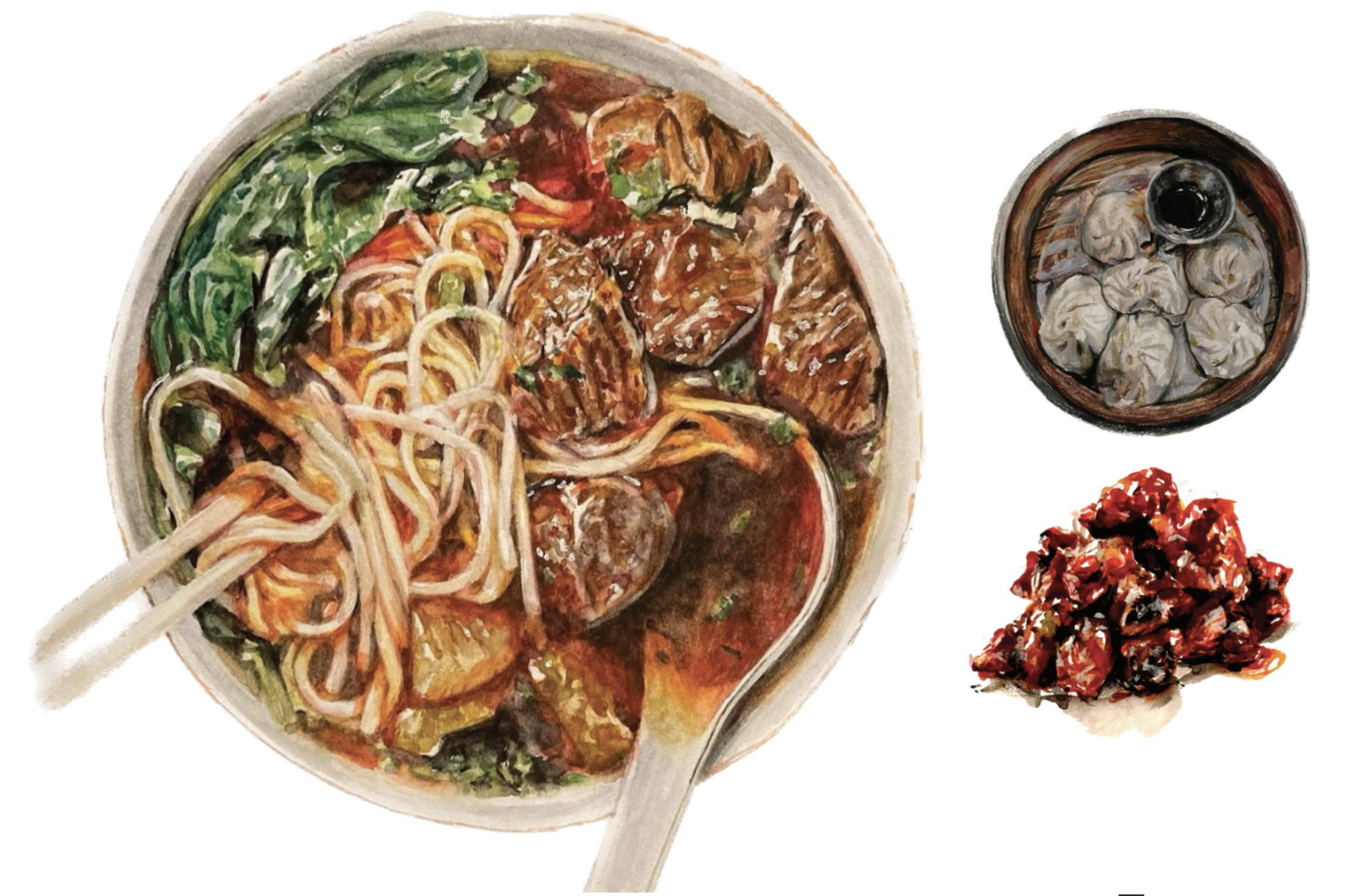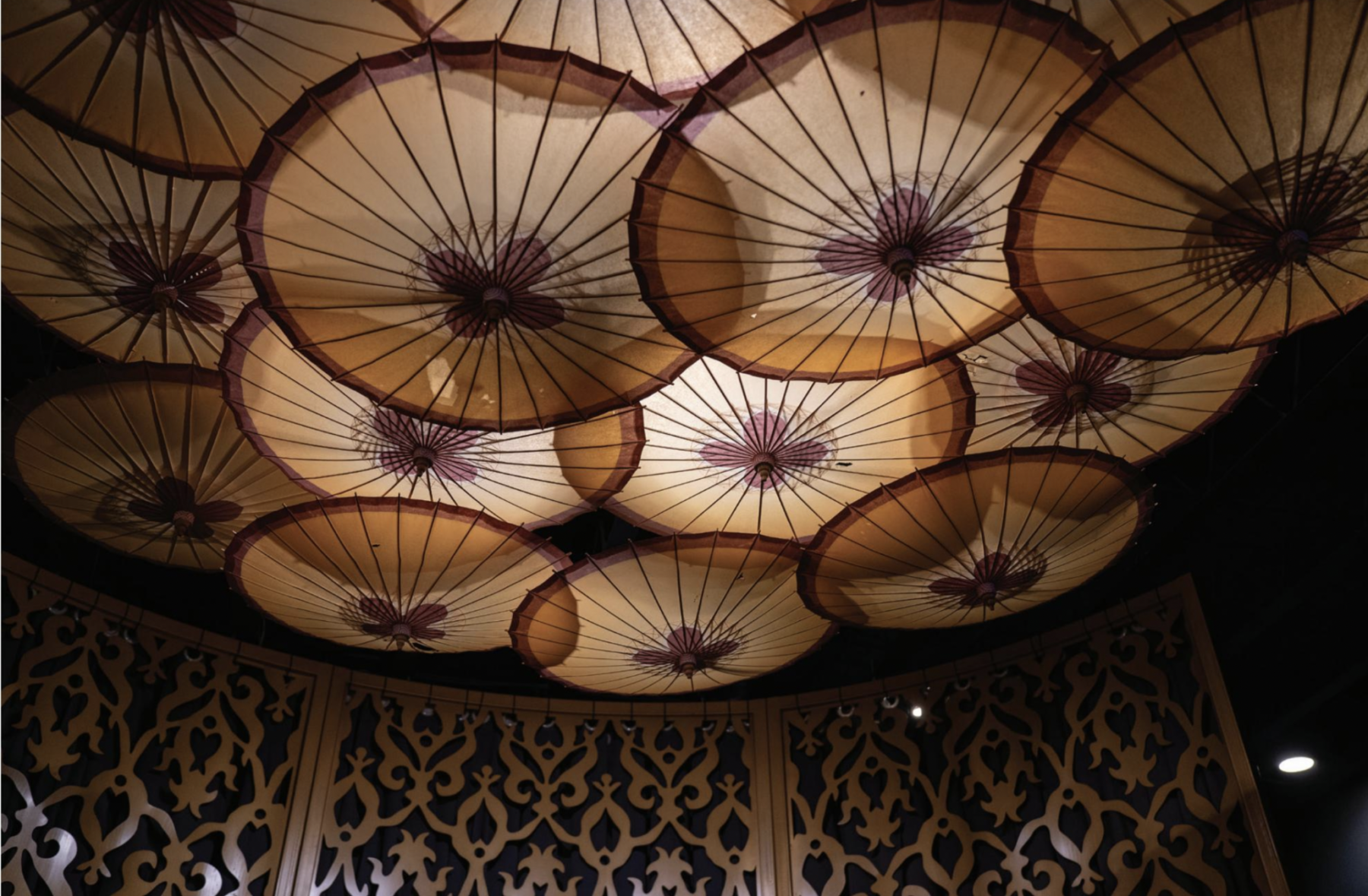Everything at Chef Jiang seems designed to reflect light. The glossy wooden tables, the seats upholstered in shiny orange vinyl, the oversized oriental vases. Even the plates of food—hot, spicy, and glistening with oil—have become surfaces of refraction.

In one photo from a profile online, Chef Jiang’s owner, Jiang Zhongshan, wears a black chef’s uniform and a white cap, and he drapes his arm commandingly over the side of a chair. In person, however, he is quiet, slow-speaking, and straight-faced—in a black zip-up hoodie and white athletic shoes. He tells me that he spends most of his time thinking about the restaurant, its workers, and its customers. I ask him if he has any funny stories, and he shakes his head. I ask him if he has ever dealt with any bad customers, and he shakes his head again. He does not seem accustomed to talking about himself.
Jiang doesn’t speak English. The first thing the restaurant’s hostess asked me when I called to schedule an interview was if I spoke Chinese. I told her that I did. That is technically true. My Chinese is good, although not as good as it should be—which is to say, not perfect. Throughout my interview with Jiang—conducted entirely in Chinese—I sometimes have to ask him to repeat himself. He does so generously. Because we so often hear about the pressures of the professional kitchen, it is easy to forget that cooking is a skill that takes a lot of forgiveness. Jiang watches as I stop in the middle of a sentence and wave my hands abstractly, searching for a way to rephrase my question. He says nothing, only smiles and waits.
Before Chef Jiang took up residence on 67 Whitney, the building was occupied by Great Wall Restaurant, a Chinese restaurant that closed down in June of 2023, after sixteen years of business. I ate there only once. It was their brunch special: a classic combination of soymilk, congee, and youtiao. I remember the tile floors and the overhead fluorescent lights. Because the restaurant was under renovation, my friends and I ate our congee out of small transparent containers with white plastic spoons.
In comparison, Chef Jiang incarnates a different, shinier version of the Chinese restaurant. “I wanted to have a place that felt modern,” Jiang tells me. Sure, there are still remnants of traditional Chinese restaurant kitsch—the neon OPEN sign in the window, a faint jazz cover of “Don’t Stop Believing” playing over the speakers—but for the most part, the space looks like something that has just been unwrapped from its plastic.
Jiang is as much a businessman as he is a cook. He tells me that every aspect of the restaurant’s physical design was carefully planned and that food is only one part of the dining experience. Jiang understands something about his customers: they value the aesthetics of the thing almost as much as the thing itself. He shows me the restaurant’s Instagram page; one reel showcases shining interiors alongside shots of chow mein, dumplings, and fried rice, all filmed aggressively up close. The video cuts to a shot of orange chicken in time to the beat of Beyoncé’s “MY HOUSE.”
***
Jiang grew up in Hunan, a province known for its spicy cuisine, and comes from a culinary family: his father was a chef, as was his grandfather. He attended culinary school and went on to work at an elite restaurant in Beijing. Hearing that economic possibilities were more plentiful in the U.S., he immigrated alone from China to the East Coast in his thirties. His wife and daughter joined him five years later, while he was working at a small Chinese restaurant in New Jersey.
A couple years ago, Jiang heard about a lease in Farmington and decided to open Chef Jiang’s first location in 2021. Whitney Avenue is his second location, which he selected in part to cater to Yale students. He has his eye on Providence—and Brown University—for his next restaurant.
I ask Jiang about his regrets; he says he has none.
“I’ve never really thought about it. I’ve never asked myself what I would have been if I hadn’t become a chef,” Jiang tells me. “The journey was so hard—really, really difficult—and required sacrifice. Not everyone who opens a restaurant will succeed. If you are lucky enough to have a restaurant, what’s the point in thinking, some fourteen years later, that you wish you hadn’t done it?”
I don’t ask him about sacrifices. When we’re not talking about the restaurant, the conversation ends quickly—perhaps, it seems to me, because he doesn’t have much to say. He briefly mentions his daughter, Lily, who will be graduating high school in the spring. Even though they are no longer separated by the Atlantic Ocean, he doesn’t get much time with her between her schoolwork and his restaurants.
“We aren’t very close,” Jiang tells me.
On the weekends, Lily sometimes takes up shifts as a host and waitress. She is not as shy as her father. “He doesn’t speak to me much,” she says in English, after I ask her about their relationship.

Still, when Jiang stops by to check on us as we chat, Lily turns to smile at him.
“What are you talking about?” he asks us.
“We’re badmouthing you,” she says, laughing, and he places his hand on her shoulder in the specific way that fathers do: fondly and with weight.
When I ask Lily to describe her father, she immediately tells me that he is very serious. When I ask Jiang to describe himself, he thinks for a moment, and then says that he considers himself a kind person. This makes Lily laugh. Nevertheless, I think that I understand what he means. Jiang rises to bring me a mug of tea the second that I sit down to interview him. He insists that I take home some food after every meeting. He tells me that his favorite person to cook for is anyone who enjoys his cooking.
The dish that is most important to Jiang is not on the menu. A stir-fry of tofu and pork is too simple to be served at most restaurants. It’s a nameless food—the sort that people cook at home. My mom makes it; Jiang’s mother made it too. As a child, his family could only afford to eat the dish once a month. They bought the pork from a man who sold meat door to door, carrying it on his back with a wooden pole. Now Jiang tells me that he does not make the dish at home. He can never recreate the flavor.
“It wasn’t that the dish even tasted that good,” Jiang says. “But I was a little kid, and I only ate it once a month.”
Jiang understands that food is situational and taste is temporal. His mother’s tofu dish exists in the past. It is the kind of thing to which he can never quite return.
***
I grew up eating at a lot of Chinese restaurants. These places were usually family-owned. They were almost always carpeted and decorated with fake plants. Some featured aquariums of large fish, and as a child, I was always worried that these fish were the same ones that would end up on the revolving table an hour or so later.
Among my family and our circle of friends, the highest praise that you could give a Chinese restaurant was to say that it was authentic. I considered authenticity the rallying cry against Americanized Chinese food, exemplified in my mind by chow mein and anything else served at Panda Express. It wasn’t even that I disliked Panda Express; in fact, I harbored a secret longing for its orange chicken and honey walnut shrimp. Still, I understood that enjoying “fake” Chinese food was the sign of being a “fake” Chinese person. The most hurtful insult of my childhood was whenever my dad, disappointed at my rejection of delicacies such as chicken feet or pig ears, would sigh and say to me, “I guess you really are an American.”
Articles reviewing Chef Jiang online make sure to highlight the restaurant’s more exotic dishes: gizzards, frogs, stinky tofu. I wonder if the perceived abnormality of these foods is meant to indicate their authenticity, as though the sign of a properly foreign meal is that it seems instinctively unappealing to the traditional American palate. I wonder, also, when Americans started caring so much about the legitimacy of ethnic food anyways.
Online, I watch a segment of a local news station from one month ago. In the video, Jiang stands alongside his marketing manager and two news anchors before four platters of food. “A lot of us are getting Chinese food, but we’re not getting the real Chinese food,” one of the news anchors explains.

That’s the selling point: authenticity. The food is real because the tofu is spicy and the fish comes with its head still attached. Jiang’s marketing manager tells the anchors that these are examples of dishes that Chinese people might cook at home, and the anchors marvel at how different this food is from the Chinese food that they had always known. Throughout the video, I watch Jiang. He says nothing, just smiles and chuckles. Everyone else is speaking in a language that he does not understand.
Jiang tells me that he adjusts his cooking to be more accessible for American customers. In addition to lowering spice levels, he has also included in his menu a section devoted to Americanized Chinese food staples like General Tso’s chicken and Mongolian Beef. Most American customers, he reasons, will first come to Chef Jiang for these familiar dishes. But when they come back, they might try something more adventurous, and then they’ll keep coming back to try new things, and they’ll bring their friends along, and this is the slow process of teaching Americans what Chinese food really is, so that someday, maybe Jiang won’t need to put General Tso’s chicken on his menu.
In the meantime, though, he tells me that he isn’t particularly bothered by questions of authenticity.
“I just want people to eat here,” he says.
***
In Chinese, when you call something authentic, you say that it is dìdào. The word itself is constructed of two characters, one meaning land, the other road. This makes me think about how the concept of authentic cuisine never would have existed if people hadn’t traveled so far away from their own native lands. The original use of the term, dating back to the Ming dynasty, was actually as praise for products of a certain locale. Since then, however, dìdào has taken on an additional meaning: that which is tangible or real. To me, there is something that feels so Chinese about this—the idea that truth must be intimately tied to home.
I eat dinner at Chef Jiang twice in the span of two weeks. The first time, I wait half an hour on a busy Saturday night to get a table with two friends, neither of whom are Chinese. We order scallion pancakes, chow fun, stir-fried lamb, bean sprouts, and Dan Dan noodles. As we eat, I find myself informing them that this is the good stuff, the real deal of Chinese cuisine. By the end of the meal, we are exhausted—both from eating and from talking about how excellent the food is.

My second dinner at Chef Jiang is during Lunar New Year, upon the invitation of a family friend—a Chinese professor at Yale. She is from Shanghai and is probably the best cook I know. I ask her how she recognizes when a dish is authentic or not. “I only really know if I’ve had it before,” she says, which I understand as her graceful way of telling me that my question is a poor one.
In the middle of dinner, I take a quick trip to the bathroom. In one corner, there is a palm-like plant in a dark blue ceramic pot. I reach down to press my fingers against the roots. I feel the smoothness of the plant and the softness of the dirt. It’s real.
After our first interview, Jiang insists that I bring some food back to my dorm. From the menu, I select the wontons in chili oil, which he packs up for me in a black plastic container.
If you want to know the truth, I have no idea if the food at Chef Jiang is authentic or not. I haven’t been back to China in close to ten years. When I go out for dinner with my non-Chinese friends and try to explain whether the scallion pancakes are real or unreal, it’s an exercise in bullshit, the indulgence in a feeling of expertise that I can claim and others cannot. This is one of the pleasures of tribalism—the ethnic secret, the esoteric knowledge, the self-aggrandizing idea that my taste buds actually do have some instinct for truth.
We never even made scallion pancakes at my house. Instead, we bought them frozen from the Chinese grocery store and heated them with slices of cheddar cheese melted blasphemously on top.
But when I sit on my couch and eat Jiang’s wontons, I remember making wontons at my kitchen table, and also the restaurant back at home where my mom used to order this same dish for me after school. I think about how these wontons taste like something familiar. And how, when we say that food is authentic, what we mean is that it tastes like something we have tasted before. That’s all it really is. Just the commonplace longing for something that you already know.
“Exactly,” Jiang says, when I try to explain all this to him at the end of our last interview. He nods at me, as though in approval. “Authenticity is just what we say about something that makes us think of home.”
— Isabelle Qian is a senior in Pierson College.
Photography by Ellie Park and Illustrations by Sarah Feng.

